New data from the Student Loans Company (SLC) reveals a rise in student loan repayments and average loan amounts. Nearly 1.8 million people in the UK now owe at least £50,000 in student debt, with over 61,000 exceeding £100,000 and 50 people owing more than £200,000.
Over a decade has passed since tuition fees in England were tripled. Since 2017, fees have been capped at £9,250 per year across the UK, except in Scotland where the maximum is £1,820 and in Northern Ireland where it is £4,710 for full-time undergraduates.
According to Ben Waltmann from the Institute for Fiscal Studies, many borrowers with “Plan 2” loans, introduced when fees were tripled, are unlikely to repay the full amount.
Previously, the SLC reported that the average loan balance at the start of repayment was under £45,000. Recent government data indicates this has now increased to £48,470.
Balances are often higher for those on multiple or extended courses, with interest rapidly inflating amounts owed. In 2023/24, about 2.8 million people in England made student loan repayments, but most still owe over £50,000, while only a small fraction exceeded £100,000.
The National Union of Students (NUS) criticised the lack of proposed reforms to student finance by major political parties during the election campaign, calling it “ridiculous.” Student debts are forgiven after 30 to 40 years, depending on the course and start date, regardless of the remaining balance.
In response to the FOI request, the SLC mentioned that people with higher-than-average debts might hold multiple student loan products, including Advanced Learner Loans and funding for various undergraduate and postgraduate courses.
High debts could also result from studying multiple or lengthy courses or having more than one loan type. Some students receive additional funding for “compelling personal reasons.”
The Conservative party claims to have frozen tuition fees and ensured that repayments do not exceed the borrowed amount in real terms.
However, both the Conservatives and Labour have not proposed substantial changes to tuition fees or student debt. Labour’s manifesto criticises the current higher education funding system and promises reforms for a secure future.
The Liberal Democrats aim to reintroduce maintenance grants for disadvantaged students and review higher education finance, while the Green Party supports abolishing tuition fees and Reform advocates for eliminating interest on student loans.




